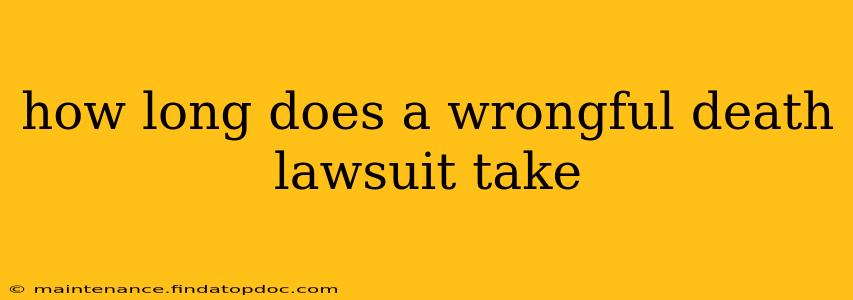The time it takes to resolve a wrongful death lawsuit is highly variable and depends on numerous factors. There's no single answer, but understanding the process and potential delays can help you manage expectations. This guide explores the typical timeline and influencing factors.
What is a Wrongful Death Lawsuit?
Before delving into timelines, let's briefly define a wrongful death lawsuit. It's a civil action filed by surviving family members of a person who died due to someone else's negligence, recklessness, or intentional wrongdoing. The lawsuit aims to recover compensation for losses incurred as a result of the death, such as medical expenses, funeral costs, lost income, and emotional distress.
Typical Stages and Timeframes in a Wrongful Death Lawsuit
A wrongful death lawsuit typically involves several stages:
1. Investigation and Claim Filing (1-6 months): This initial phase involves gathering evidence, interviewing witnesses, and potentially consulting with experts like accident reconstructionists or medical professionals. The plaintiff's attorney will then file a formal complaint with the court. The complexity of the case heavily influences this stage's duration. A straightforward case with clear liability might take only a few months, while a complex case involving multiple parties or extensive investigation could take significantly longer.
2. Discovery (6-18 months or longer): This is arguably the longest phase. Both sides exchange information through depositions (sworn testimony), interrogatories (written questions), requests for documents, and other discovery methods. The goal is to uncover all relevant facts and evidence. Disputes over discovery requests can significantly prolong this phase.
3. Settlement Negotiations (Ongoing throughout the process): Attorneys for both sides may engage in settlement negotiations at any point, even before discovery is complete. A successful settlement avoids a trial. The willingness of the defendant to settle and the strength of the plaintiff's case impact the likelihood and speed of a settlement.
4. Trial Preparation (3-6 months): If a settlement isn't reached, both sides prepare for trial. This involves selecting a jury, preparing witnesses, and presenting evidence.
5. Trial (1-4 weeks): The trial itself can range from a few days to several weeks depending on the complexity and amount of evidence.
6. Post-Trial Proceedings (1-6 months): After a verdict, there may be post-trial motions, appeals, or other proceedings. A losing party might appeal the decision, further delaying the final resolution.
Overall Timeline: Considering all these stages, a wrongful death lawsuit can take anywhere from one to five years, or even longer in complex cases.
H2: What Factors Can Prolong a Wrongful Death Lawsuit?
Several factors can significantly impact the duration of a wrongful death lawsuit:
H3: How does the complexity of the case affect the timeline?
Cases involving multiple defendants, intricate medical issues, extensive investigation needs, or multiple jurisdictions will naturally take much longer to resolve. A simple car accident case with clear liability might settle much quicker than a complex medical malpractice case.
H3: What role do insurance companies play in the duration of the case?
Insurance companies often represent the defendants, and their involvement can significantly influence the timeline. They may delay the process through protracted negotiations, extensive discovery requests, or even litigation tactics designed to wear down the plaintiff.
H3: What if there are multiple parties involved?
Cases with multiple defendants (e.g., multiple drivers in a car accident, multiple healthcare providers in a medical malpractice case) will generally take longer to resolve due to the increased complexity of coordinating discovery, settlement negotiations, and legal strategies.
H3: How does the location of the lawsuit affect the timeframe?
Court backlogs vary between jurisdictions. Some courts have more efficient case management systems than others, leading to shorter or longer timelines depending on the location.
H2: How can I speed up the process?
While you can't force the legal process to move faster, cooperating fully with your attorney, responding promptly to discovery requests, and engaging constructively in settlement negotiations can contribute to a more efficient resolution.
H2: What are some common causes of wrongful death lawsuits?
Wrongful death cases stem from various causes, including medical malpractice, car accidents, workplace accidents, product liability, and criminal acts. The specific cause directly impacts the complexity and potential timeline.
Disclaimer: This information is for educational purposes only and should not be considered legal advice. If you are involved in a wrongful death lawsuit, it's crucial to consult with a qualified attorney in your area. They can provide personalized guidance based on the specifics of your case and the laws in your jurisdiction.
